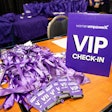
It’s an uncertain time to be working in the events industry in the U.S. In addition to political unrest—such as this week’s widespread protests in Los Angeles—gatherings of all types are being shaped by changing tariffs, the rollback of DEI programs, and overall geopolitical instability.
One area being affected particularly hard is international attendance at U.S. events, in the wake of the Trump administration's current immigration policies. In addition to a full travel ban for citizens of 12 countries—mostly in Africa and the Middle East—foreign travelers from many other regions are reporting increased scrutiny at airports; Canada and several European nations have even issued enhanced travel advisories for the U.S.
“If you’re planning high-stakes gatherings across the U.S., you’ve likely felt it: the undercurrent of hesitation. Visa delays, political tension, security concerns, public perception,” says Valerie Bihet, the owner of VIBE Agency in Miami who regularly produces events around the world. “International attendees aren’t always saying ‘no,’ but they are often taking longer to say ‘yes.’”
These anxieties are already having a measurable impact—and event professionals are adapting fast.
The Growing Fallout: Canceled Events and Hesitant Travelers
While the situation is very much in flux, the stories are piling up. Some would-be event attendees—like prominent LGBTQ+ activist Phyll Opoku-Gyimah, who was trying to travel from the U.K. to Washington, D.C. for the WorldPride 2025 Human Rights Conference—are being denied visas. Some events are moving to Canada or Europe, while others are being outright canceled.In a high-profile example, INCYBER Forum, Europe’s largest annual cybersecurity conference, recently postponed its Texas event scheduled for next week. It would have been the organization’s first-ever U.S. event and was expected to draw 5,000 attendees.
“The current policy and economic environment remains both challenging and unpredictable,” a spokesperson told the San Antonio Report, “and the decision to pause the San Antonio conference is consistent with similar decisions made by several other U.S. conferences whose success is impacted by the broader geopolitical and policy landscape.”
The International Association of Cognitive Behavioral Therapy also recently canceled its Nashville conference. In a message to attendees, the conference chair openly cited “the actions and regulations of the Trump administration related to funding and international relations.”
Erin Fuller, the Washington, D.C.-based chief strategy officer and global head of association solutions for MCI USA, describes what she calls a "bifurcated" impact: "Either you're not affected at all, or you're super affected—it's very binary."
According to a recent study by ASAE, cited by Fuller, about half of associations reported no change in international attendance. But for the other half, the decline has been substantial. One April 2025 conference saw a 15% to 19% drop in attendance, Fuller notes, with losses attributed to U.S. travel restrictions and delayed visa approvals. Another medical organization reported a 30% drop in global attendance.
"These patterns suggest that policy shifts—whether real or perceived—can significantly influence participation," she told BizBash.
And the concern goes both ways. Fuller is finding that U.S.-based attendees are increasingly hesitant to travel abroad for events as well, citing economic caution, institutional travel restrictions, and geopolitical instability. “There’s a complexity to navigating international entry requirements post-pandemic that continues to be a deterrent,” she explains.
Who’s Most Affected—and Why
Simon Gerzina, the senior manager of digital and production for Boston-based tech company Akamai, regularly works on B2B events globally—and says his team has observed a reluctance to attend U.S.-based events among senior-level international guests in particular.“We just had our first big U.S.-based event of the year, and the climate definitely affected interest, particularly with more senior-level attendees who might have more at stake if they get turned back at the border and miss the event,” Gerzina says. “I suspect people are choosing where to take that risk. They might go to one major industry conference rather than attend a bunch of smaller partner or vendor events.”
In his experience, the effect varies significantly by country of origin. “China and the Middle East seem to be taking the most cautious approach,” he says, noting that attendance from those regions has dropped, while he hasn’t noticed the same effect from European guests. Latin American attendance has also remained strong, he observes. “I would have expected a more exaggerated drop from Latin America, but that wasn’t the case at our event.”
He believes that anxiety and risk perception are the main factors at play here. “Some customers told us their companies had instituted a policy of ‘no non-essential U.S. travel’ for the foreseeable future,” he says. “Depending on the industry or risk profile, companies might simply decide it’s not worth it right now.”
Visa processing issues have also added to the challenge. “We’ve had some international employees trying to attend internal events over the last six months who couldn’t get visas, or the process was way more involved than usual,” Gerzina adds. “Normally, they could get a visa within a week or two. But this time, they couldn’t guarantee they’d have one in time, so they had to cancel their travel.”
One area that might see different treatment is international sporting events. The Trump administration’s travel ban “does include specific exemptions for the World Cup and Olympics, along with any other major sporting event as determined by the Secretary of State,” reports The New York Times. “The exemption allows athletes, coaches, ‘immediate relatives,’ and anyone ‘performing a necessary support role’ from banned or restricted countries to travel to the U.S. … Questions remain, however, around what constitutes a ‘major sporting event,’ and who is included in ‘immediate relatives.’”
The Economy’s Effect
Although politics and perception certainly play a central role, economic pressures are likely amplifying the problem, points out Gerzina, noting that with travel and lodging costs on the rise, many companies are tightening their T&E budgets. "It's one of the easiest areas to cut," he notes.To address this, Gerzina and his team have been doubling down on a more regional event model, enabling localized engagement while cutting down on long-haul travel. “Even for our European events, which we used to consider Pan-European, we’re hearing things like, ‘A one-day event shouldn’t require a hotel stay,’ he says. “So we’re adjusting schedules to allow same-day travel, or at least reduce overnight stays.”
There are upsides to this new model. More focused, localized gatherings often lead to richer interactions, he notes, adding: "Rather than being one of 2,000 people, many attendees would rather be one of the right 100 or 200.”
How Else Planners Are Shifting Strategy
To address mounting uncertainty, producers are adapting quickly. Fuller says MCI has taken a proactive approach by integrating strategic communications that emphasize clarity, reassurance, and support. “We ground our attendee communications in audience segmentation and behavioral insights,” she says, “ensuring that messaging is tailored to the specific concerns of international attendees.”What exactly does that look like? Fuller outlines four steps her team is taking:
- Plan early and communicate often. “Build in extra time for visa processing and provide attendees with clear, updated travel guidance,” she says.
- Diversify participation formats: Fuller notes that hybrid models can help maintain global engagement even when travel is restricted.
- Leverage local expertise: “Looking for opportunities to combine global strategy with local execution ensures adaptability and resilience,” she says.
- Stay informed and advocate: “Engage with industry associations and policy groups to stay ahead of regulatory changes and advocate for more accessible travel policies.”
Gerzina stresses the importance of sensitivity right now. “There’s not much we can do except be sensitive and look for alternate solutions,” he says. “It’s all so unpredictable: travel costs are fluctuating wildly, flight cancelations and delays are up, and hotel surge pricing feels worse than previous years. … Companies have to make their own decisions about acceptable risk and cost.”
Bihet echoes that sentiment, noting she’s leaning into what she calls “messaging with heart."
“We’re doubling down on what matters,” she says, stressing the value of cultural fluency in everything from multilingual signage to personalized welcomes. “We’re not just translating materials. We’re creating cultural liaisons. … [It’s about] events that celebrate unity, connection, and shared experience, not politics.”
Is the U.S. Still a Welcoming Destination for Business Events?
“I want to say yes—but it’s a qualified yes,” says Gerzina, noting that this isn’t just a recent phenomenon. “We’ve seen some U.S. cities become much less event-friendly over time.” He cites cities like San Francisco, once a conference hub, which has seen rising costs, union mandates, and quality-of-life issues that make it less attractive. While cities like Las Vegas and New York remain appealing, high costs are narrowing their accessibility. “The U.S. still has a lot going for it, but it’s getting harder to justify putting all your eggs in that basket,” he adds.Fuller agrees. “While the U.S. remains a hub for innovation and global convening, the perception of openness has been challenged,” she says. “As a global firm, MCI emphasizes the value of cultural fluency and local execution. We continue to advocate for inclusive, accessible events and work closely with clients to mitigate barriers.”
The Path Forward
For now, agility is the name of the game. “It feels like that 2022 moment when we were all wondering, ‘Are people ready to come back to in-person events?’” points out Gerzina. “Now it’s: ‘Are people willing to travel to this market? How much lead time do we need? How much attrition should we expect?’”His team is now conducting what he calls "quiet testing" before locking in venues and dates. “We check in with attendees, get a sense of whether they'd come to a certain city on a certain date, and use that warm RSVP to inform our planning. It reduces the risk of kill fees and failed turnouts,” he says. “We're not just assuming it’s business as usual.”
For Bihet, it’s all about keeping the guest experience top of mind. “While we can’t control governments, we can control how every guest feels the moment they walk through our doors: safe, valued, and delighted.”
For the latest guidance on traveling to the U.S., including Visa or ESTA requirements, bookmark this page from the U.S. Travel Association.



















